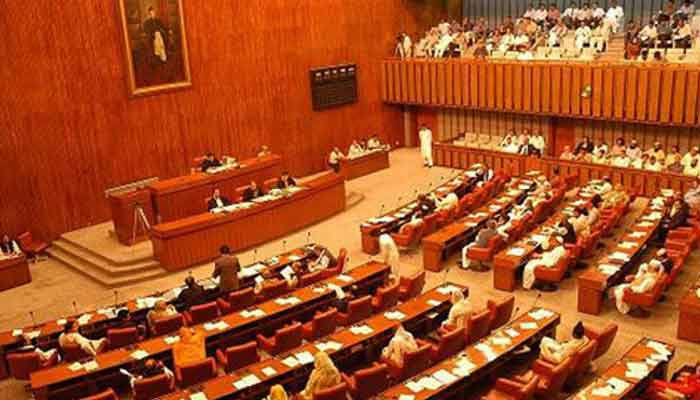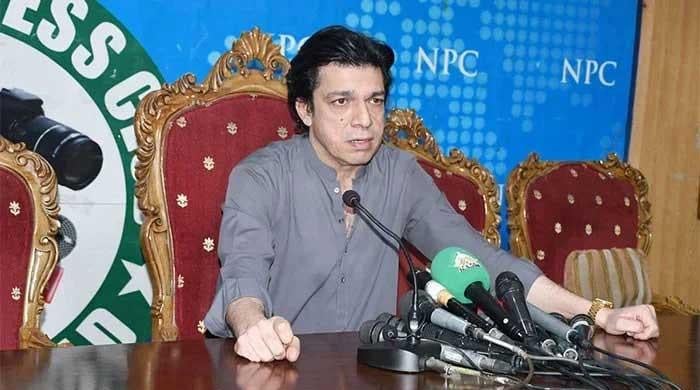Imran Khan slammed in Senate for 'supporting Taliban'
Senators condemned the PTI, which used to say that “these terrorists are our brothers"
February 21, 2023

- Senators asked why NAP was abandoned during PTI rule.
- Senator Palwasha condemns Imran for allegedly supporting TTP militants.
- Waqar Mehdi also blasts Imran for supporting Taliban.
Pakistan Tehreek-e-Insaf (PTI) Chairman Imran Khan was condemned in the Senate for allegedly supporting the Taliban and attempting to open offices to facilitate their rehabilitation in the country.
During the proceedings on Monday, senators wanted to know why Paigham-i-Pakistan and the National Action Plan were not implemented and rather abandoned during the PTI government. Pakistan Peoples Party Senator Palwasha Muhammad Zai, on a point of public importance, in her hard-hitting speech, slammed the PTI chairman for allegedly supporting the militants. She questioned, in her hard-hitting speech, which was interrupted by some PTI legislators, including two PTI lady members, “who resettled the terrorists under an organised plan?”
She pointed out that the PPP and PMLN governments had been fighting militants and criticised the PTI leadership, which used to say that “these terrorists are our brothers” and “they should be brought into the national mainstream" after holding talks with them.
The senator said how close Imran was to them could be gauged from the fact that the banned Tehreek-i-Taliban Pakistan (TTP) had nominated him as their representative for talks with the then government. She also criticised the Leader of the Opposition, Senator Dr Shahzad Waseem, for his speech earlier and noted that it was Imran Khan who, in an interview with foreign media on September 16, 2021, had asked the world to give some time to the Taliban on human rights to prove their credentials.
She regretted that 70,000 Pakistanis and personnel of the LEAs had sacrificed their lives when Imran Khan made these remarks and also supported Harbyar Marri and spoke against the country’s armed forces in a London court.
The PPP lawmaker noted that the PTI had never condemned any form of terrorism and pointed out that militants returned to Pakistan when Imran Khan was prime minister, and he should tell who resettled these terrorists in the country. On the audio leaks issue, she said that phone calls should not be recorded on personal matters but should be recorded on issues concerning national security.
Making his first speech after having been administered an oath as a senator, Syed Waqar Mehdi also blasted the PTI chairman and claimed that terrorists were supported and encouraged during the previous government's tenure. However, he added that a terrorist cannot be good in any form, because a terrorist is a terrorist, but Imran Khan’s position has been that a terrorist can be good or bad.
“Imran Khan’s name was included in the representative committee that the Taliban had formed in the past to negotiate with the government of Pakistan,” he also said. Senator Mehdi said that after the recent terrorist incident in Peshawar, the government had decided to summon an all-party conference, but it was Imran who refused to participate in the conference, which was tantamount to encouraging terrorists.
He said: “Terrorism is a national problem, but Imran Khan has no interest in this issue of national importance.” Then, referring to the apex committees formed about combating terror, he asked “how many meetings of these committees were held by the governments of Punjab, Khyber Pakhtunkhwa, and Balochistan.”
During the private members’ day proceedings, the elites were also accused of “occupying previous national resources” and causing poverty, and social and moral decadence in society as a result of its lavish lifestyle.
Jamaat-i-Islami Senator Mushtaq Ahmad, while speaking on his motion regarding the “increasing sale and purchase of alcoholic drinks, their consumption up to a dangerous level, and the issue of crimes arising out of it in the country,” warned that stringent measures must be taken before it is too late. He claimed that alcohol is a disease of the elites that is rapidly spreading throughout society, resulting in rapid increases in crime rates.
He referred to Article 31 of the Constitution and the Quranic injunctions to lament that instead of the state creating an enabling environment for its citizens to live their lives by Islam, things were being run contrary to it, and the state was not fulfilling its responsibility.
The Quaid-i-Azam, during his brief time after Pakistan came into being, he pointed out, had banned alcohol, established the State Bank of Pakistan for the abolishment of interest, and set up the Department of Reconstruction.
The JI legislator explained that how the state “facilitated” the elite class was obvious from these instances, including that Islamabad Guns Club was given 72 acres of land for free, and that he had also put a question, which was referred to the House committee concerned by the chair.
Whereas he continued, the Islamabad Club consisted of 272 acres of land, which was allotted at Re 1 per acre, and likewise, the Pakistan Golf Federation comprises 150 acres of land, which has been given to them for Rs 2.50 per square foot.
He questioned how alcohol was being smuggled into Pakistan in the presence of the Coast Guard, FC, Customs, and other institutions, claiming billions of rupees were pocketed against this criminal negligence.
Later, speaking on a point of public importance, Senator Mushtaq lamented that terrorists were free to strike across the country, from Peshawar police lines to Karachi police, and that even the “red zones” were unsafe.
“The poor nation spends Rs3,000 billion on the military, intelligence agencies, police, and judiciary, and yet the menace of terrorism is not being combated, and 2.1 million cases are pending with courts while judges are found involved in political maneuvering,” he noted.
He emphasised that a meeting of the Senate committee as a whole should be summoned, and the military leadership, ISI, Military Intelligence DGs, and others concerned should be invited to find a way out. Otherwise, he added, the Senate was becoming merely a debating club. He regretted that Paigham-i-Pakistan and the National Action Plan were not being implemented despite widespread support.
State Minister for Law Shahadat Awan responded to his speech and said that there were laws about the import, production, transportation, and smuggling of alcohol, and it was a crime. These laws, he noted, were in the field and being enforced.
Immediately after the recitation from the Holy Quran, Leader of the Opposition Dr. Shahzad Waseem said the threats of terrorism and challenges to the economy were increasing, as were the emergence of audio and video tapes, which were available in the market according to the occasion and need.
He also referred to the recent audio tape of PTI senior leader Dr. Yasmin Rashid and said that even the prime minister’s secure line was not secure. He regretted that the status of Article 04 and related laws was not more than a piece of paper. “Under what law is all of this taking place?” There are no checks and balances,” he retorted.
The leader of the opposition said that the government circus was going on, as he came hard on the ministers and said they were at liberty to issue statements, and the defence minister had said that the country had gone bankrupt. He regretted that the government was focused on its rivals and that issues like terrorism and the economy were not on its priority list.
During a charged scene in the House, PPP Senator Nisar Ahmad Khuhro rose to ask who used to speak in support of terrorists and who first brought around a videotape of the NAB chairman to blackmail him. “Stop talking about the Constitution and the law; who would repeatedly say I and they are on the same page?” he remarked and asked the opposition to have some reflection.
He wondered why he (Imran) was heaping criticism on those who had forced him to choose one, and why he was making such a fuss now that he was no longer alive.
Another PPP lawmaker, Bahramand Tangi, expressed regret that the opposition leader was now complaining about audio leaks while Imran Khan had previously forced the NAB to work under his orders. He alleged that when in government, the PTI had threatened and blackmailed the heads of institutions by recording their phones.
During legislation, PTI’s Senator Zeeshan Khanzada’s bill for shifting the State Bank of Pakistan to Islamabad was rejected through headcount, as 11 were in its favour and 17 were against it.
Likewise, BAP Senator Samina Mumtaz Zehri also faced stiff resistance from the Treasury benches to her bill to amend Benazir Income Support Law to increase support funds while keeping in view the inflation ratio, and it was defeated by 22 votes to 17.
However, PPP’s Saleem Mandviwala assured the protesting senator that her intention was good and a revised bill might be brought to the House, as in its present shape, it could not be taken up.
A bill further amending the Civil Servants Act, 1973 [the Civil Servants (Amendment) Bill, 2023], introduced by Senators Syed Muzaffar Hussain Shah, Hidayat Ullah, Zeeshan Khanzada, and Dilawar Khan, was referred to the committee concerned for deliberations and a report. The bill aims to prohibit civil servants from using tactics (such as re-employment extensions and securing jobs by forming different projects) to continue working even after retirement, denying talented and deserving individuals and causing deprivation and brain drain.









